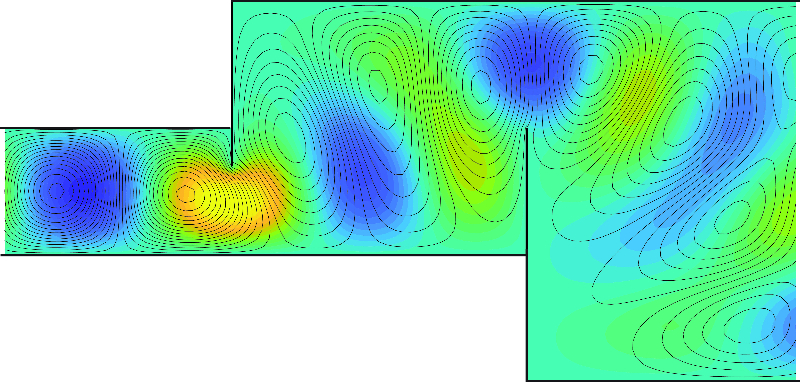- decomposition of the fields and Maxwell's equations in isotropic media
- analysis of propagating and evanescent TM-, TE- & TEM-modes in metallic hollow waveguides
- hollow waveguides with rectangular and circular cross-sections
- application of mode orthogonality at excitation from sources and at energy transport
- the mode matching method to analyse scattering at discontinuities
- analysis of attenuation of and coupling between waveguide modes
- analysis of resonance cavities, orthogonality relations, losses and bandwidth
- planar dielectric waveguides and optical fibres
- analysis of the quasi-TEM modes in multiconductor systems
EI2410 Field Theory for Guided Waves 7.5 credits

Information for research students about course offerings
In 2023 we offer to read the PhD-student version FEI3301 of this course (in coordination).
About course offering
For course offering
Spring 2025 TEFRM programme students
Target group
Open to all programmes as long as it can be included in your programme.
Part of programme
Master's Programme, Electromagnetics, Fusion and Space Engineering, åk 1, MIC, Mandatory
Periods
P3 (7.5 hp)Duration
Pace of study
50%
Form of study
Normal Daytime
Language of instruction
English
Course location
KTH Campus
Number of places
Min: 10
Planned modular schedule
Course memo
Course memo is not publishedSchedule
Schedule is not publishedApplication
For course offering
Spring 2025 TEFRM programme students
Application code
60151
Contact
For course offering
Spring 2025 TEFRM programme students
Contact
Martin Norgren
Examiner
No information insertedCourse coordinator
No information insertedTeachers
No information insertedContent and learning outcomes
Course contents
Intended learning outcomes
Having passed the course, the student should be able to
- demonstrate conceptual understanding and prove general principles of electromagnetic fields in waveguides
in order to be able to use the electromagnetic laws combined with mathematical methods to solve electromagnetic field problems.
To obtain higher grades, the student shall be able to
- with progression in both completeness and width demonstrate skills in solving specific guided wave problems.
Literature and preparations
Specific prerequisites
- Completed course at first cycle level in electromagnetic theory equivalent to one of EI1220 and EI1320.
- Completed course in mathematical methods in physics, containing vector calculus, separation of variables and orthogonal functions equivalent to SI1200 Mathematical Methods of Physics.
Recommended prerequisites
Basic courses in electromagnetic theory. Course in mathematical methods in physics and complex analysis are recommended.
Equipment
Literature
Examination and completion
If the course is discontinued, students may request to be examined during the following two academic years.
Grading scale
Examination
- PROA - Project, 1.5 credits, grading scale: A, B, C, D, E, FX, F
- TENA - Written exam, 6.0 credits, grading scale: A, B, C, D, E, FX, F
Based on recommendation from KTH’s coordinator for disabilities, the examiner will decide how to adapt an examination for students with documented disability.
The examiner may apply another examination format when re-examining individual students.
Opportunity to complete the requirements via supplementary examination
Opportunity to raise an approved grade via renewed examination
Examiner
Ethical approach
- All members of a group are responsible for the group's work.
- In any assessment, every student shall honestly disclose any help received and sources used.
- In an oral assessment, every student shall be able to present and answer questions about the entire assignment and solution.
Further information
Course room in Canvas
Offered by
Main field of study
Education cycle
Add-on studies
EI2400 Applied Antenna Theory
EI2420 Electromagnetic Wave Propagation
Contact
Transitional regulations
Students course registered with the item TEN1 follow the new the course structure and the result on TEN1 corresponds then corresponds to the weighted result of PROA and TENA.
Supplementary information
In this course, the EECS code of honor applies, see: http://www.kth.se/en/eecs/utbildning/hederskodex.